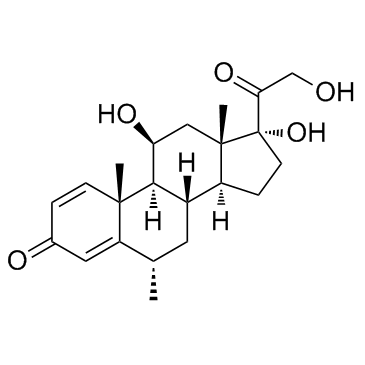甲基泼尼松龙

甲基泼尼松龙结构式

|
常用名 | 甲基泼尼松龙 | 英文名 | Methylprednisolone |
|---|---|---|---|---|
| CAS号 | 83-43-2 | 分子量 | 374.471 | |
| 密度 | 1.3±0.1 g/cm3 | 沸点 | 571.8±50.0 °C at 760 mmHg | |
| 分子式 | C22H30O5 | 熔点 | 228-237°C (dec.) | |
| MSDS | 中文版 美版 | 闪点 | 313.7±26.6 °C |
甲基泼尼松龙用途Methylprednisolone是皮质类固醇,可作用于糖皮质激素受体。 |
| 中文名 | 6α-甲基泼尼松龙 |
|---|---|
| 英文名 | 6α-methylprednisolone |
| 中文别名 | 甲基泼尼松龙 | 11β,17α,21-三羟基-6α-甲基-1,4-孕甾二烯-3,20-二酮 | 甲基强的松龙 | 甲基氢化泼尼松 | 6α-甲基-11β,17α,21-三羟基-1,4-孕甾二烯-3,20-二酮 | 甲泼尼龙 |
| 英文别名 | 更多 |
| 描述 | Methylprednisolone是皮质类固醇,可作用于糖皮质激素受体。 |
|---|---|
| 相关类别 | |
| 参考文献 |
| 密度 | 1.3±0.1 g/cm3 |
|---|---|
| 沸点 | 571.8±50.0 °C at 760 mmHg |
| 熔点 | 228-237°C (dec.) |
| 分子式 | C22H30O5 |
| 分子量 | 374.471 |
| 闪点 | 313.7±26.6 °C |
| 精确质量 | 374.209320 |
| PSA | 94.83000 |
| LogP | 1.99 |
| InChIKey | VHRSUDSXCMQTMA-PJHHCJLFSA-N |
| SMILES | CC1CC2C(C(O)CC3(C)C2CCC3(O)C(=O)CO)C2(C)C=CC(=O)C=C12 |
| 外观性状 | 白色至灰白色结晶粉末 |
| 蒸汽压 | 0.0±3.6 mmHg at 25°C |
| 折射率 | 1.603 |
| 储存条件 | 本品应密封干燥保存。 |
| 水溶解性 | chloroform/methanol (9:1): 50 mg/mL, clear, faintly yellow |
| 分子结构 | 1、 摩尔折射率:100.08 2、 摩尔体积(m3/mol):291.4 3、 等张比容(90.2K):804.8 4、 表面张力(dyne/cm):58.1 5、 极化率(10-24cm3):39.67 |
| 计算化学 | 1.疏水参数计算参考值(XlogP):无 2.氢键供体数量:3 3.氢键受体数量:5 4.可旋转化学键数量:2 5.互变异构体数量:9 6.拓扑分子极性表面积94.8 7.重原子数量:27 8.表面电荷:0 9.复杂度:754 10.同位素原子数量:0 11.确定原子立构中心数量:8 12.不确定原子立构中心数量:0 13.确定化学键立构中心数量:0 14.不确定化学键立构中心数量:0 15.共价键单元数量:1 |
| 更多 | 1. 性状:无色结晶。 2. 密度(g/mL,25/4℃):不确定 3. 相对蒸汽密度(g/mL,空气=1):不确定 4. 熔点(ºC):228~237℃ 5. 沸点(ºC,常压):不确定 6. 沸点(ºC,5.2kPa):不确定 7. 折射率:不确定 8. 闪点(ºC):不确定 9. 比旋光度(º):[α]D20 +83°(二氧六环中)。 10. 自燃点或引燃温度(ºC):不确定 11. 蒸气压(kPa,25ºC):不确定 12. 饱和蒸气压(kPa,60ºC):不确定 13. 燃烧热(KJ/mol):不确定 14. 临界温度(ºC):不确定 15. 临界压力(KPa):不确定 16. 油水(辛醇/水)分配系数的对数值:不确定 17. 爆炸上限(%,V/V):不确定 18. 爆炸下限(%,V/V):不确定 19. 溶解性:略微溶于乙醇、二氧六环、甲醇,微溶于丙酮、氯仿,极微溶于乙醚,不溶于水 |
|
甲基泼尼松龙毒理学数据: 1、急性毒性: 人肠道TDLO:2400 ug/kg;人静脉TDLO:60 mg/kg/3D-I 人静脉TDLO:20 mg/kg/45W-C 大鼠口径LD50:>4mg/kg; 小鼠腹腔LD50:2292mg/kg; 2、其他多剂量毒性: 狗口径TDL0:210 mg/kg/6W-I |
|
Cheminformatics analysis of assertions mined from literature that describe drug-induced liver injury in different species.
Chem. Res. Toxicol. 23 , 171-83, (2010) Drug-induced liver injury is one of the main causes of drug attrition. The ability to predict the liver effects of drug candidates from their chemical structures is critical to help guide experimental... |
|
|
Revival of physostigmine - a novel HPLC assay for simultaneous determination of physostigmine and its metabolite eseroline designed for a pharmacokinetic study of septic patients.
Clin. Chem. Lab Med. 53 , 1259-64, (2015) Physostigmine, commonly used as an antidote in anticholinergic poisoning, is reported to have additional pharmacological effects, such as activation of the cholinergic anti-inflammatory pathway in sep... |
|
|
Translating clinical findings into knowledge in drug safety evaluation--drug induced liver injury prediction system (DILIps).
J. Sci. Ind. Res. 65(10) , 808, (2006) Drug-induced liver injury (DILI) is a significant concern in drug development due to the poor concordance between preclinical and clinical findings of liver toxicity. We hypothesized that the DILI typ... |
| (6S,8S,9S,10R,11S,13S,14S,17R)-11,17-dihydroxy-17-(2-hydroxyacetyl)-6,10,13-trimethyl-7,8,9,11,12,14,15,16-octahydro-6H-cyclopenta[a]phenanthren-3-one |
| MFCD00010591 |
| EINECS 201-476-4 |
| Methylprednisolone |
| 6alpha-methylprednisolone |


